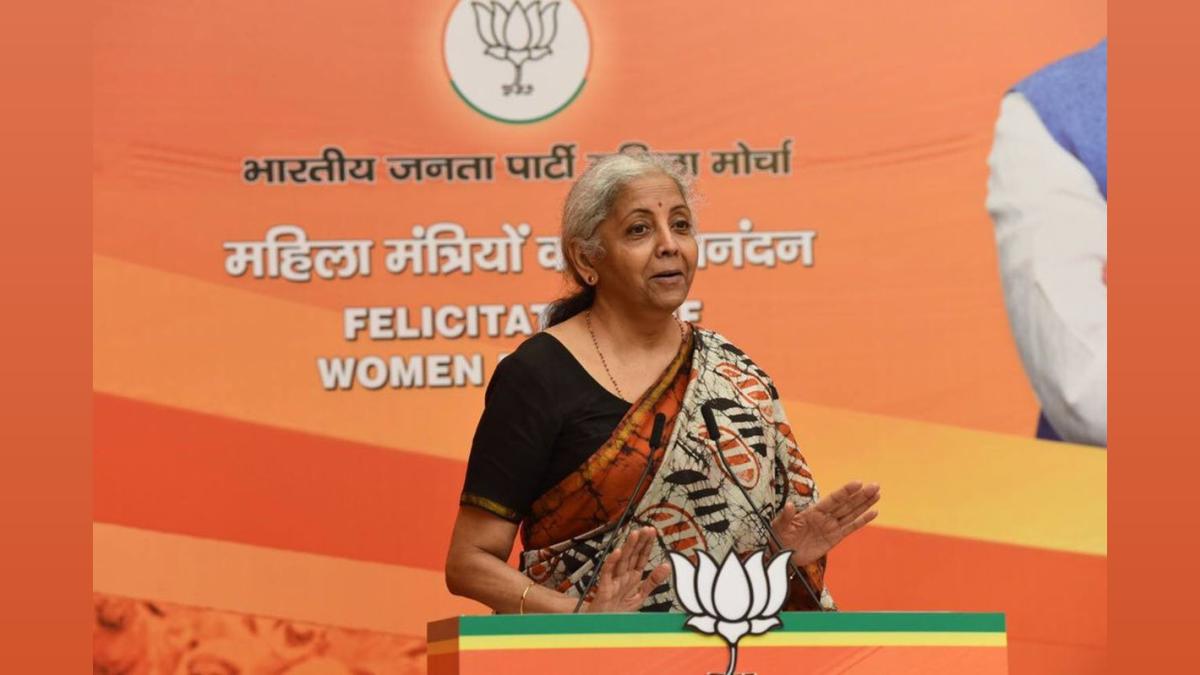Sitharaman Criticizes Border Tax for Green Goals
Finance Minister Nirmala Sitharaman criticizes developed countries' border adjustment tax for green goals, calling it 'unmoral' and against developing nations' interests. She emphasizes inclusive global solutions for green commitments.

Photograph: Kind courtesy Nirmala Sitharaman/Twitter
New Delhi, Dec 7 (PTI) Finance Minister Nirmala Sitharaman on Thursday said developed countries' move to levy a border adjustment tax to fund their own green commitments is "not moral" at all and is against the concerns of developing nations.
She said the global thought process will have to be inclusive for countries in the journey to achieve green goals, rather than a "single mono-sided decision" to bring in a border adjustment tax.
"I want to make my industry green so I will impose on you a certain tax because you are coming up with non-green products and with that money I will make my industry green... Border adjustment tax logic just goes against the concerns of the global south.
"Every country will have to have resources generated to meet with demands so that we are better adjusted to the green commitments we have made globally. But cross border imposition and that money going towards somebody else's green agenda, if anything, is not moral at all," Sitharaman said at the CII Global Economic Policy Forum.
Her comments come in the backdrop of the European Union's announcement to impose carbon tax on imports from certain sectors.
The CBAM (Carbon Border Adjustment Mechanism) or carbon tax (a kind of import duty) will come into effect from January 1, 2026, but from October 1 this year, domestic companies from seven carbon-intensive sectors, including steel, cement, fertiliser, aluminium and hydrocarbon products, will have to share data with regard to carbon emissions with the EU.
In her address, Sitharaman said the base energy requirements of a country cannot be filled by renewable energy sources, but it is possible to think in terms of spreading renewable energy in such a way that individual participation is ensured.
India is rapidly moving in the renewable energy space, particularly in solar, and is in talks with many countries for a grid connectivity across the world by the ISA (International Solar Alliance) members, she said.
Talking about rupee movement against dollar, Sitharaman said post the geopolitical turmoil emanating from the Russia-Ukraine war and its economic implication, the US dollar strengthened disproportionately compared to other currencies to the extent that it continues to be a concern for many countries of global south.
The Indian rupee has depreciated 0.8 per cent so far in 2023.
"It (strengthening of dollar) is a concern for many countries, particularly of global south. We have facilitated many countries in engaging with India using the rupee, because rupee has been very stable against most currency. Particularly against US dollar, Indian rupee has held up strongly against dollar. Dollar value has gone up disproportionately much more than many other countries but if any currency has withstood the pressure its Indian rupee," the finance minister said.
She said India is actively promoting and taking forward rupee trade. In South Asia and some countries in Africa already started the process of having rupee trade.
"On the larger issue... which currency it would be if it is not the US dollar, I think there is a lot of discussion and thought process... and it's going to be not an immediate thing ...it is floating around, we will have to see how it's going to work out," Sitharaman said.
She said the global thought process will have to be inclusive for countries in the journey to achieve green goals, rather than a "single mono-sided decision" to bring in a border adjustment tax.
"I want to make my industry green so I will impose on you a certain tax because you are coming up with non-green products and with that money I will make my industry green... Border adjustment tax logic just goes against the concerns of the global south.
"Every country will have to have resources generated to meet with demands so that we are better adjusted to the green commitments we have made globally. But cross border imposition and that money going towards somebody else's green agenda, if anything, is not moral at all," Sitharaman said at the CII Global Economic Policy Forum.
Her comments come in the backdrop of the European Union's announcement to impose carbon tax on imports from certain sectors.
The CBAM (Carbon Border Adjustment Mechanism) or carbon tax (a kind of import duty) will come into effect from January 1, 2026, but from October 1 this year, domestic companies from seven carbon-intensive sectors, including steel, cement, fertiliser, aluminium and hydrocarbon products, will have to share data with regard to carbon emissions with the EU.
In her address, Sitharaman said the base energy requirements of a country cannot be filled by renewable energy sources, but it is possible to think in terms of spreading renewable energy in such a way that individual participation is ensured.
India is rapidly moving in the renewable energy space, particularly in solar, and is in talks with many countries for a grid connectivity across the world by the ISA (International Solar Alliance) members, she said.
Talking about rupee movement against dollar, Sitharaman said post the geopolitical turmoil emanating from the Russia-Ukraine war and its economic implication, the US dollar strengthened disproportionately compared to other currencies to the extent that it continues to be a concern for many countries of global south.
The Indian rupee has depreciated 0.8 per cent so far in 2023.
"It (strengthening of dollar) is a concern for many countries, particularly of global south. We have facilitated many countries in engaging with India using the rupee, because rupee has been very stable against most currency. Particularly against US dollar, Indian rupee has held up strongly against dollar. Dollar value has gone up disproportionately much more than many other countries but if any currency has withstood the pressure its Indian rupee," the finance minister said.
She said India is actively promoting and taking forward rupee trade. In South Asia and some countries in Africa already started the process of having rupee trade.
"On the larger issue... which currency it would be if it is not the US dollar, I think there is a lot of discussion and thought process... and it's going to be not an immediate thing ...it is floating around, we will have to see how it's going to work out," Sitharaman said.
You May Like To Read
TODAY'S MOST TRADED COMPANIES
- Company Name
- Price
- Volume
- Vodafone Idea L
- 8.07 (+ 10.25)
- 148356970
- YES Bank Ltd.
- 18.82 (+ 4.04)
- 29198368
- Suzlon Energy Ltd.
- 60.31 (+ 9.50)
- 27077911
- Sharanam Infra
- 0.64 (+ 4.92)
- 19722829
- G G Engineering
- 0.87 ( -4.40)
- 18141861






 © 2025 Rediff.com India Limited. All rights reserved.
© 2025 Rediff.com India Limited. All rights reserved.